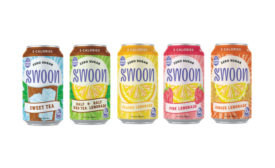Home » sugar reduction
Articles Tagged with ''sugar reduction''
Consumer demand for healthier beverages is not expected to wane any time soon.
Read More
Swoon inks deal with Big Geyser to expand retailer network
Zero-sugar beverage brand partners with New York's top non-alcohol beverage distributor.
March 8, 2023
Batory to distribute SugarLike product line
The company inked an agreement with NutraEx Food Inc.
March 7, 2023
Behind the Scenes at EverGrain’s production facility
Upcycled brewery byproducts unlock new barley flours, sustainable proteins for ready-to-drink beverages.
February 27, 2023
Batory Foods' new entity to place huge emphasis on sugar reduction
Batory Sweetener Solutions, comes on the heels of Batory Foods’ acquisition of Savannah-based Sweetener Solutions in early 2022.
January 11, 2023
Ingredients of the future are certain to incorporate health benefits
Consumers continue to seek functional products, while the ‘jury is out’ on hybrid products
September 18, 2022
Slash sugar in yogurt
Ingredient suppliers have a number of tools to help with sugar-reduction goals.
April 22, 2022
Slash the sugar in dairy products
Dairy products made with natural sugar alternatives — and that deliver a satisfactory sensory experience — will resonate with today’s consumers.
April 11, 2022
Sugar reduction top of mind among consumers
Sweetener blends deliver the sweet spot in reduced-sugar dairy applications.
January 12, 2022
Cultures and enzymes are the secret ingredients in dairy product development
They work behind the scenes to aid in dairy product innovation and enhancement.
June 1, 2021
Stay ahead of the curve. Unlock a dose of cutting-edge insights.
Receive our premium content directly to your inbox.
SIGN-UP TODAYCopyright ©2025. All Rights Reserved BNP Media.
Design, CMS, Hosting & Web Development :: ePublishing














